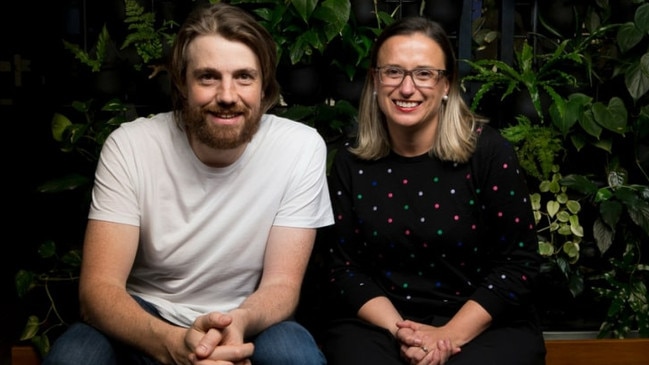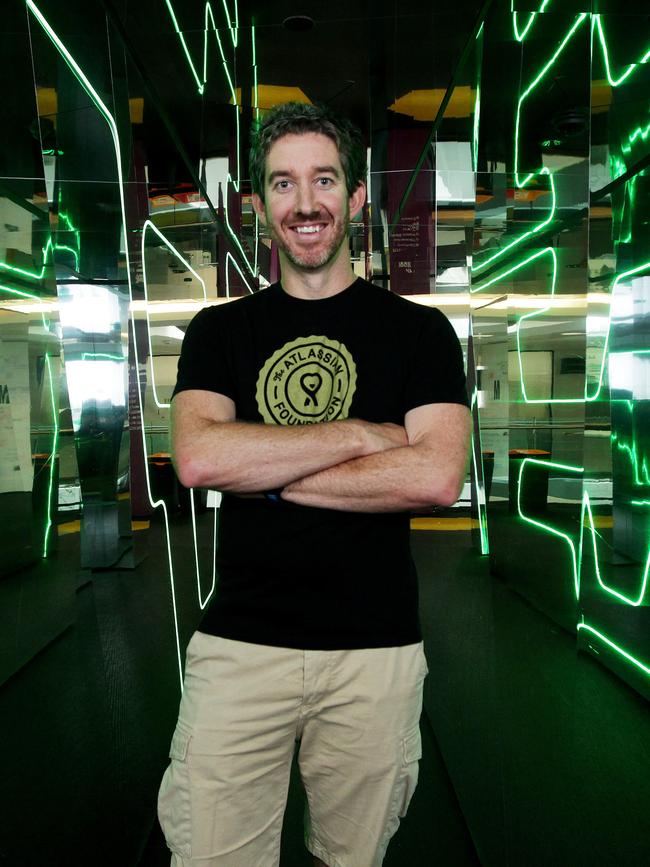Aussie tech titans forge new alliance to double down on green energy push
Top tech entrepreneurs are rallying together to power the ‘energy renaissance’ as Donald Trump winds back projects aimed at tackling climate change, branding it the ‘green new scam’.

Business
Don't miss out on the headlines from Business. Followed categories will be added to My News.
Australia’s top tech entrepreneurs are rallying together to power the “energy renaissance” as US President Donald Trump winds back projects aimed at tackling climate change, branding it the “green new scam”.
The Tech Council of Australia on Tuesday launched the Consumer Tech Alliance, attracting industry heavyweights such the Mike Cannon-Brooke and Scott Farquhar-backed Brighte – a buy now, pay later company that funds rooftop solar and battery installations.
CETA aims to support the energy transition, “lower prices and increase system reliability”.
“CETA represents an opportunity for the next cohort of innovative companies to help drive an energy renaissance,” said Mr Farquhar, who stepped down as Atlassian co-chief executive last year and is a Tech Council of Australia director.
“Innovative tech is the spark that will ensure Australia builds a flexible and reliable decentralised energy system – one that accelerates the energy transition and showcases amazing homegrown talent,” he said.
“To get this right, Australians must be empowered to choose energy solutions that align with their needs and are incentivised to ensure CER (consumer energy resources) are promoted as a cornerstone of the national energy agenda.”
But Australians are struggling to pay for home batteries before they can even contemplate “orchestrating” their use to stabilise the grid.
While rooftop solar power has surged in popularity in the past 20 years, battery storage hasn’t because it’s too expensive. This has led to an influx of solar energy that flooded the grid with excess electricity, and fuelled negative wholesale prices.

Brighte chief executive Katherine McConnell said the biggest barrier was buying a battery, given a battery and solar system could cost up to $25,000.
“It’s the price of a small car. Before people can even start to think about ‘how can I get a revenue stream for that battery that helps me defray the cost?’ – they can’t even get to that point because they haven’t been able to think through how can I even get it on the wall,” she said.
Battery storage and smart technologies like virtual power plants are considered crucial to helping stabilise the grid by storing solar power outside of peak times and then exporting electricity during times of high demand. This helps avoid the grid becoming flooded.
“The future really is that batteries need to be orchestrated. A battery needs to be able to create the reliability, not just for your own home, but also the wide system,” Ms McConnell said.
“Because of that, there’s a really compelling argument as to why the government should contribute to the incentives around installing batteries.”
This could include stamp duty concession for installing solar and batteries during new builds among other initiatives.
Ms McConnell said during the pandemic, Italy introduced a subsidised tax deduction of 110 per cent over five years for battery energy storage systems.

“We need to do everything we can, to get houses to move from solar to batteries. In new builds it’s a bit of a waste if you’re not getting the electrical wiring set up at that point to be able to have electrified homes. (We need) to look at how you can make that more affordable at that point, whether it’s through it, like a stamp duty or … some type of depreciation regime.”
But the world’s biggest economy is heading in the opposite direction. In West Virginia, a start-up paused the installation of rooftop solar panels after its government reimbursement for about 30 such projects fell through, The Wall Street Journal reported.
“A lot of the debate is around coal and the contribution it makes to the reliable energy mix today, and the rate at which that’s going to be displaced, and then as that gets displaced, what is going to replace coal?” Ms McConnell said.
“If we speak to you know, certain sides of politics, they’ll say it’s going to be fully renewables. And if you speak to other sides of politics they’ll entertain that green nuclear may start to come into the mix in the future.
“What we aren’t disputing though, is that consumer energy resources are going to play a meaningful part. I think that the time at which coal comes off, the time at which utility scale wind or utility scale solar comes on – that’s what’s being debated in the US. So it’s large- scale offshore wind, you know, large-scale solar, and I think we’re having those discussions here in Australia as well. But I think the there seems to be alignment on consumers, and consumers are getting things like solar and batteries.”
Tech Council chief executive Damian Kassabgi said the Consumer Energy Tech Alliance represented “exciting opportunities”.
“CETA is based on three key pillars: placing consumers at the heart of the energy transition; lowering power prices and increasing system reliability; and ensuring a fair and competitive environment for Australia’s energy technology innovators,” Mr Kassabgi said.
“As renewable energy adoption grows, there needs to be stable, efficient, and affordable integration into the grid. CETA champions a balanced approach, combining innovation with system security so that Australia can realise the full potential of its consumer energy resources.”
CETA’s founding members are Brighte, Reposit Power, eLumina Global, Evie Networks, Neara, SNAPI, MyPlace, CATCH Power and Smartizer.
Originally published as Aussie tech titans forge new alliance to double down on green energy push



